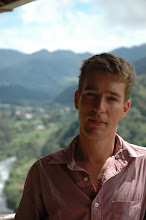Impressions of Cameroon seem to be bursting in on me from all directions. The past few days have been spent at the beach, first at the idyllic and undeveloped southern town of Kribi, and now at the Anglophone town of Limbé further north, nestling below the murky slopes of Mt. Cameroon, an active volcano and West Africa's highest peak at 4,095m. Here the sand is black from the action of the sea on millennia of lava flows. Just along the coast is the second rainiest place in the World, so we have been lucky to be undisturbed by showers, though it is the dry season. The climate is hot and humid with an afternoon breeze off the sea affording welcome relief when it arrives. Visibility is not the greatest due to the climatic conditions, so the mountain is a hazy presence at the best of times, though it has gifted the area a fabulous biodiversity that is obvious to see in the beautiful botanical gardens at Limbé and more generally in the lush vegetation that abounds allabouts.
Kribi is the Palm Beach of Cameroon with discrete villas belonging to government misiters tucked back from the beach. However, there are very few hotels and the town appears to operate like any other, though I notice there was church provision for tourists at one of the absolutely packed Sunday services I strolled past. Kribi is not the real Cameroon in the sense that it is overpriced and accesed via a proper paved road, but eseentially it serves an internal tourism function and it is absolutely unspoiled by beach commercialism in the Western sense. It's unquestionably the most beautiful beach destination I've ever visited.
I passed a couple of days walking along uninterrupted miles of pristine sand fringed by jungle, pausing to watch local kids playing footie at low tide, and knots of fisherman working in teams to make a catch directly off the beach. They do this by positioning a canoe-style fishing boat carved from a single tree trunk a couple of hundred metres offshore. A net runs in two lines from the boat to the shore with a team of men on each line slowly pulling the net in. Any catch is divided amongst the men, who might number as many as thirty in total, so pickings can be pretty thin at the end of a long day heaving on nets in 30°C sunshine. Yet this is a major form of employment hereabouts as witnessed by the large number of boats you encounter pulled up upon the sand. The sizzle and smell of frying fish is a welcome sound as you wander your way, and the crevettes and baracuda I tried at our campsite restaurant were quite superb.
A couple of kilometres down the coast we came upon the unusual sight of a river cascading into the Atlantic down a waterfall. We managed to hire a boat here to take us upriver to a pygmy village. The village turned out to be a bit bogus with several of the pygmies looking none too short at all and primitive seating area constructed for visiting tourists, but the boat trip through the jungle was spectacular. This was the type of jungle you get in Tarzan movies with great long creepers cascading down from gigantic trees, and the constant, but sightless, sound of activity in the undergrowth.
For all the beauty and abundance though, Cameroon is a poor country grappling with enormous corruption problems and the menace of violent crime fuelled by unemployment and extreme need. Douala did not feel like a safe town to go walking around as a tourist, and though the atmosphere is much more relaxed outside the city, you notice the presence of armed guards on a surprisingly wide range of buildings. People have told me that the infrastructure has been in decline for the past few years, so one wonders if things are going to get worse before they get better.
The biggest problem to development is the endemic corruption everywhere which seems to be bad even by West African stabdards. Public officials demand bribes because they don't get paid their salaries. The strength of the tribal system enables chiefs and bigwigs to syphon off all manner of funds from their communities. I talked to a western volunteer working for a foreign government sponsored aid programme who was facing an enormous ethical dilemma in working to promote community savings in agricultural microbanks, the idea being to encourage them to invest as a cushion against the tremendous uncertainties of subsistence life in this country. It was put to me in these terms - for the average person in a rural community, if you get sick, you either get better or you die. And yet, this volunteer was conscious that a good proportion of these savings were being embezzled by the bank directors, and the volunteer's position did not enable them to openly challenge the situation. Such a challenge would be construed as a political act, something that would directly contravene the terms under which the organisation works and can operate in the country.
People have no knowledge or experience on which to draw to sort out problems themselves. It tells you something that it's not uncommon to find that ancestral skulls are used as collatoral for bank loans here. Ironically, many of these loans go to pay for the elaborate funerals that are such a part of life here during the 'funeral season', when the rains stop and people can get around the place. These funerals might be held months or years after a person has died and involve the body being disinterred for the celebrations.
Still despite the problems and the crime it's hard to imagine a friendlier place or a more smilely people. It's intriguing.

